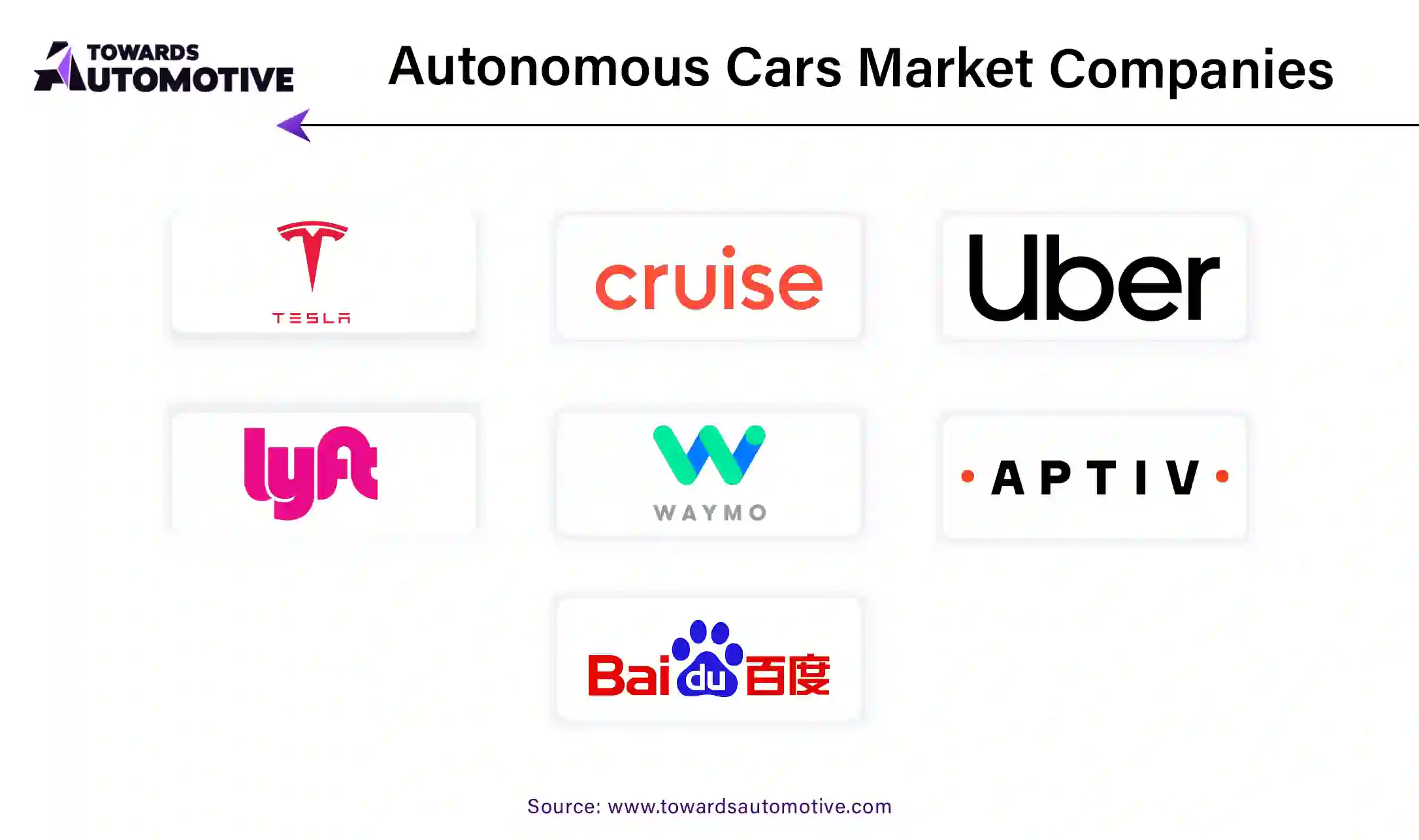April 2025

Senior Research Analyst

Reviewed By
The global autonomous cars market is projected to reach USD 6.034 trillion by 2034, growing from USD 2,332 trillion in 2025, at a CAGR of 11.39% during the forecast period from 2025 to 2034.

The autonomous cars market represents a groundbreaking shift in the automotive industry, driven by advancements in artificial intelligence (AI), sensor technology, and connectivity solutions. Autonomous cars, also known as self-driving vehicles, leverage a combination of AI-powered software, cameras, radars, and LiDAR systems to navigate and operate with minimal or no human intervention. This transformative technology is redefining transportation by promising enhanced safety, improved efficiency, and reduced human error on roads.
The market is witnessing rapid growth due to increasing investments from automakers, technology firms, and governments worldwide. Key players are actively developing and testing autonomous systems, with the goal of making self-driving vehicles a commercial reality. The growing demand for mobility-as-a-service (MaaS) solutions, such as ride-hailing and car-sharing platforms, is further accelerating the adoption of autonomous cars. These vehicles are seen as a cornerstone for creating efficient, smart cities, where traffic congestion and pollution are significantly reduced.
Safety remains a significant driver for this market, as autonomous vehicles aim to drastically reduce accidents caused by human error. The integration of advanced driver assistance systems (ADAS) and other safety features in autonomous cars ensures compliance with strict safety regulations, boosting consumer confidence. Additionally, the rise in electric and hybrid autonomous cars aligns with global sustainability goals, creating a synergistic relationship between two transformative technologies.
Artificial Intelligence (AI) plays a pivotal role in shaping the autonomous cars market, serving as the core technology enabling vehicles to navigate, make decisions, and operate safely without human intervention. AI is responsible for processing the vast amounts of data generated by sensors, cameras, LiDAR, and radar systems integrated into autonomous vehicles. Through machine learning (ML) and deep learning algorithms, AI allows cars to recognize objects, understand their surroundings, predict movements, and make real-time decisions.
One of AI's most critical applications in autonomous cars is in computer vision, which enables vehicles to interpret visual data from cameras for tasks like identifying road signs, detecting pedestrians, and analyzing traffic patterns. This capability ensures precise navigation and adherence to traffic regulations. Additionally, AI-driven sensor fusion combines data from various sources to create a comprehensive 3D model of the car's environment, ensuring safety even in complex scenarios such as adverse weather or crowded urban areas.
AI also facilitates the development of predictive analytics, allowing autonomous vehicles to anticipate potential hazards, avoid collisions, and optimize route planning. These systems adapt to changing road conditions and learn from past experiences, continuously improving their performance over time. Furthermore, AI is essential for vehicle-to-everything (V2X) communication, enabling seamless interaction between cars, infrastructure, and other connected devices.
In the broader ecosystem, AI supports the deployment of autonomous cars by driving advancements in simulation technologies for testing and training self-driving algorithms. It also enhances the efficiency of fleet management in mobility-as-a-service (MaaS) platforms by optimizing routing, maintenance, and energy consumption.
As the backbone of autonomous driving technology, AI accelerates the adoption of self-driving cars and helps in achieving the industry’s goal of achieving safer, more efficient, and sustainable transportation systems worldwide.
Advanced automotive safety features are crucial drivers of the growth of the autonomous cars market, as they form the backbone of self-driving vehicle technology. As consumer concerns about vehicle safety and the potential for accidents remain a significant barrier to autonomous vehicle adoption, innovations in advanced safety systems help build trust and confidence in autonomous cars. Technologies such as automatic emergency braking (AEB), adaptive cruise control, lane-keeping assistance, and collision detection systems are integral components of the safety suite in autonomous vehicles, providing a foundation for fully autonomous operations.
These safety technologies not only improve the performance of autonomous vehicles in complex traffic situations but also enhance overall road safety by reducing human error, which is responsible for the majority of traffic accidents. By incorporating AI and machine learning algorithms, autonomous cars can process data from sensors, cameras, and radars in real-time, making split-second decisions that enhance safety and prevent accidents before they occur. This increased safety is a key selling point for both consumers and regulatory bodies, helping to accelerate the acceptance and deployment of autonomous vehicles.
In addition to driver and passenger safety, these technologies contribute to the development of smarter and more efficient traffic management systems. Autonomous vehicles equipped with advanced safety features can communicate with other vehicles and infrastructure, enabling coordinated responses to traffic patterns and hazards. This collaboration reduces the likelihood of accidents, traffic congestion, and improves the overall flow of urban transportation.
The autonomous cars market faces significant restraints, including high development costs, technological complexities, and regulatory challenges. The integration of advanced sensors, AI systems, and connectivity infrastructure requires substantial investment, making production and adoption expensive. Additionally, unresolved issues such as liability in accidents, data privacy concerns, and cybersecurity threats hinder market growth. Public skepticism and lack of trust in autonomous technology further slow its acceptance. Moreover, the absence of standardized regulations across regions complicates testing and deployment, impeding widespread adoption.
Ride-hailing services present significant opportunities in the autonomous cars market by offering a practical and scalable platform for deploying self-driving technologies. These services align with the growing consumer preference for cost-effective, convenient, and on-demand transportation solutions, particularly in densely populated urban areas.
The integration of autonomous vehicles into ride-hailing fleets can also improve service efficiency and reliability. Self-driving cars can operate 24/7 without the limitations of human drivers, such as fatigue or schedule constraints. This capability allows companies to optimize fleet utilization, reduce waiting times for riders, and meet peak demand more effectively. Furthermore, AVs equipped with advanced navigation systems can streamline routes, minimize travel times, and enhance fuel efficiency, contributing to an improved user experience.
Ride-hailing services serve as an ideal testing ground for autonomous technology adoption due to their structured environments and repetitive routes. Companies like Uber, Waymo, and Lyft are already piloting autonomous ride-hailing programs in select cities, gathering valuable data to refine their technology and build consumer trust. The growing acceptance of shared mobility further supports this trend, as users increasingly prioritize convenience and sustainability over vehicle ownership.
Additionally, autonomous ride-hailing aligns with smart city initiatives aimed at reducing traffic congestion and emissions. AVs equipped with electric drivetrains contribute to cleaner urban environments while integrating seamlessly with intelligent transportation systems. Governments and private enterprises are incentivizing these developments through policy support and infrastructure investments, fostering a conducive ecosystem for autonomous ride-hailing.
The semi-autonomous segment held the largest share of the market. The semi-autonomous segment is a significant driver of the growth of the autonomous cars market, bridging the gap between conventional vehicles and fully autonomous cars. Semi-autonomous cars incorporate advanced driver assistance systems (ADAS) such as adaptive cruise control, lane-keeping assist, automatic braking, and parking assistance, which enhance safety, convenience, and driving efficiency. These features appeal to consumers who value innovation but are not yet ready to embrace fully self-driving vehicles, thereby creating a large potential market.
One of the main factors driving growth in this segment is regulatory support for safety features integrated into semi-autonomous vehicles. Governments worldwide are encouraging the adoption of technologies like emergency braking systems and collision avoidance, which are key components of semi-autonomous cars. In many regions, regulations increasingly mandate such systems, further accelerating their adoption.
Additionally, semi-autonomous vehicles are more cost-effective compared to fully autonomous options, making them accessible to a broader range of consumers. This affordability expands the market reach, especially in developing regions where fully autonomous technologies may still face economic and infrastructural challenges.
The segment also benefits from technological advancements in AI, sensors, and connectivity. Semi-autonomous vehicles leverage real-time data processing and vehicle-to-everything (V2X) communication to deliver enhanced functionality, building consumer trust in autonomous technology. Furthermore, automakers and tech companies are heavily investing in improving these systems, ensuring continuous upgrades and better user experiences.
The semi-autonomous segment serves as a stepping stone for widespread acceptance of autonomous vehicles. By familiarizing consumers with the benefits of automation and enhancing road safety, this segment significantly contributes to the overall growth of the autonomous cars market. It also provides valuable data and insights for developing and refining fully autonomous systems, ensuring a smoother transition toward a driverless future.
The passenger cars segment led the industry. The passenger cars segment plays a pivotal role in driving the growth of the autonomous cars market, owing to its large consumer base and continuous demand for advanced driving solutions. Passenger vehicles account for a significant portion of global automotive sales, providing a fertile ground for the integration of autonomous technologies. Automakers are increasingly incorporating features like advanced driver assistance systems (ADAS), adaptive cruise control, lane-keeping assist, and automated parking into passenger cars, making them more appealing to tech-savvy consumers.
One of the key drivers in this segment is the growing consumer demand for enhanced safety, convenience, and comfort. Autonomous technologies address these needs by reducing human error, which is a leading cause of road accidents, and by offering features that make driving less stressful, particularly in congested urban areas. This has led to increased adoption of semi-autonomous passenger vehicles, which serve as a gateway to fully autonomous cars.
Additionally, rising urbanization and the increasing number of smart city initiatives have created a demand for connected and autonomous passenger cars that can seamlessly integrate with intelligent transportation systems. These vehicles use real-time data and vehicle-to-everything (V2X) communication to improve traffic flow and reduce emissions, aligning with global sustainability goals.
The passenger car segment also benefits from significant investments in R&D by automakers and technology companies. These investments aim to enhance the reliability and affordability of autonomous systems, making them accessible to a broader consumer base. Furthermore, government regulations mandating safety features like automatic braking and lane-departure warning systems are driving the adoption of autonomous technologies in this segment.
As passenger cars continue to evolve with advancements in AI, sensors, and connectivity, they remain a crucial segment for the growth of the autonomous cars market, setting the stage for broader acceptance and adoption of fully autonomous vehicles.
Asia Pacific dominated the autonomous cars market. The autonomous cars market in Asia Pacific is experiencing rapid growth due to a combination of technological advancements, urbanization, and supportive government initiatives. The region's rising focus on smart city development and the integration of advanced mobility solutions drive the adoption of autonomous vehicles (AVs). Countries like China, Japan, and South Korea are leading the charge with significant investments in AI, robotics, and connectivity infrastructure to support self-driving technologies.
Asia Pacific’s burgeoning middle class and increasing urban population demand safer, more efficient transportation solutions, further propelling market growth. The growing adoption of ride-hailing and car-sharing services, aligns with the integration of autonomous vehicles, enabling cost-efficient and convenient transportation. Additionally, stringent government regulations to reduce traffic congestion and emissions foster the development of electric and hybrid autonomous cars.
Collaboration between automakers, tech companies, and governments in Asia Pacific accelerates innovation in AV technology. For instance, pilot programs and partnerships for testing autonomous cars on public roads in Japan and Singapore demonstrate the region’s commitment to advancing this market.
Furthermore, Asia Pacific's robust manufacturing ecosystem, particularly in China, supports the mass production of autonomous vehicles at competitive prices. As the region continues to invest in AI, machine learning, and mobility technologies, the autonomous cars market is set to flourish, positioning Asia Pacific as a global leader in self-driving innovation.
Europe is expected to grow with a significant CAGR during the forecast period. The autonomous cars market in Europe is experiencing robust growth, driven by technological innovation, government support, and increasing demand for sustainable and efficient transportation solutions. Europe is at the forefront of developing and implementing advanced autonomous vehicle (AV) technologies, supported by a strong ecosystem of automakers, tech firms, and research institutions. Countries such as Germany, the UK, and France are investing heavily in AI, robotics, and sensor technologies to enhance self-driving capabilities.
Government initiatives and supportive regulations play a crucial role in accelerating market growth. The European Union (EU) promotes the adoption of autonomous vehicles through funding programs, research grants, and the establishment of standardized testing and safety protocols. Additionally, the region’s focus on reducing traffic congestion, improving road safety, and lowering carbon emissions aligns with the adoption of autonomous and electric vehicles.
Europe’s extensive infrastructure development, including smart roads and high-speed internet connectivity, supports the integration of autonomous technologies. The rise of mobility-as-a-service (MaaS) platforms, further fuels market growth as urban centers seek more efficient transportation solutions. The region's commitment to sustainability also boosts demand for electric and hybrid autonomous cars.
Consumer preferences for luxury and technologically advanced vehicles contribute to the market’s expansion. Automakers in Europe are actively collaborating with tech firms to enhance features like AI-powered driver assistance systems, connectivity, and real-time data analysis. With ongoing advancements in 5G connectivity and vehicle-to-everything (V2X) communication, Europe is well-positioned to lead in the adoption and commercialization of autonomous cars. These factors collectively make Europe a key player in shaping the global autonomous vehicle industry.

By Type
By Vehicle Type
By Region
April 2025
April 2025
April 2025
April 2025
Dr. Arjun Patel is a distinguished expert in the automotive industry, holding advanced degrees in Automotive Engineering and Mechanical Engineering. His expertise spans automotive market dynamics, technological advancements, and sustainable practices. Dr. Patel excels in conducting in depth research and analysis on market trends, consumer preferences, and the economic implications within the automotive sector. He is renowned for his insightful publications on topics such as electric vehicles, autonomous driving technologies, and the evolution of sustainable transportation solutions. Dr. Patels research contributions have significantly advanced understanding in the field, earning him recognition as a leading authority in automotive research and analysis.
We offer automotive expertise for market projections and customizable research, adaptable to diverse strategic approaches.
Contact Us